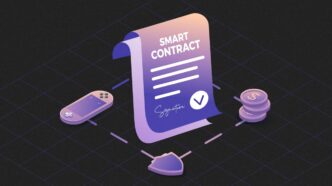In 2025, startups are fighting harder than ever to attract top talent, all while juggling tight budgets and limited teams. But as Bitcoin stabilizes after years of wild swings, another blockchain breakthrough is quietly transforming how startups manage their people: smart contracts. These self-executing digital agreements offer a faster, leaner, and more transparent way to run human resources, freeing startups to scale without drowning in admin work.
What Exactly Are Smart Contracts?
Smart contracts are digital agreements written directly into code, programmed to run automatically once certain conditions are met. Built on blockchain networks—those decentralized digital ledgers that are secure and tamper-proof—these contracts execute actions without needing a third party to step in.
Unlike old-school agreements that rely on lawyers or middlemen, smart contracts enforce themselves. This autonomy slashes costs, speeds up HR processes, and cuts down on the mistakes and misunderstandings that often slow startups down.
How Smart Contracts Are Transforming HR for Startups
Startups usually operate with lean HR teams—sometimes just a founder doing triple duty. Smart contracts step in as a powerful ally, helping growing companies handle:
1. Seamless Hiring and Onboarding
The hiring process is typically a tangle of paperwork, contract negotiations, and access setups. Smart contracts can:
- Instantly verify a candidate’s credentials against trusted databases
- Manage digital employment contracts with automatic signatures
- Kickstart onboarding processes the moment an offer is accepted
- Grant access to systems on a new hire’s first day
- Send out welcome packs and required training automatically
This hands-off approach saves hours of manual labor and ensures every new hire hits the ground running.
2. Transparent Compensation Management
Money matters—and confusion about salaries or bonuses can create friction fast. Smart contracts bring clarity by:
- Automating salary payments on set schedules
- Calculating bonuses based on clear, pre-agreed performance goals
- Managing stock options and crypto token awards based on vesting timelines
- Adjusting pay automatically based on measurable achievements
- Recording every payment securely and transparently
Employees know exactly what they’re earning and why—boosting trust and reducing HR headaches.
3. Smarter Benefits Administration
Benefits management often becomes a messy, time-consuming chore. Smart contracts simplify it by:
- Auto-enrolling eligible employees in benefits programs
- Applying deductions accurately during payroll
- Approving claims for flexible spending accounts in real time
- Tracking vacation days and sick leave automatically
- Updating benefits when life changes happen, like marriage or parenthood
This means fewer errors, faster processing, and happier teams.
4. Fairer, Faster Performance Reviews
Nobody enjoys annual performance reviews that feel subjective and rushed. With smart contracts:
- Objective performance metrics are tracked continuously
- Automated feedback is sent once goals are hit—or missed
- Bonuses and promotions can be triggered without delay
- Performance histories are stored securely on the blockchain
- Peer reviews happen with clear rules and built-in accountability
The result? Employees get fair, consistent feedback, and managers spend less time on paperwork.
5. Rock-Solid Compliance and Record Keeping
As startups expand, staying on top of local labor laws becomes a huge burden. Smart contracts help by:
- Auto-generating regulatory documents
- Creating unchangeable records of contracts, promotions, and exits
- Calculating and withholding the correct taxes
- Maintaining a full audit trail for every HR action
- Adapting policies automatically when laws change
This slashes compliance risks and ensures companies are always ready for audits or disputes.
Real-World Applications Gaining Traction in 2025
By now, several smart contract use cases are becoming staples in startup HR departments:
- Token-Based Incentive Programs: Employees earn crypto rewards tied directly to hitting key milestones.
- Decentralized Skill Verification: Teams can validate candidate skills without relying solely on resumes or referrals.
- Automated Onboarding Journeys: New hires receive a fully customized, legal-compliant experience without HR lifting a finger.
- Compliance Bots: These automatically adjust company policies when employment laws shift, saving startups from costly mistakes.
Challenges Startups Should Prepare For
Of course, adopting smart contracts isn’t without hurdles:
- Technical Complexity: Setting up smart contracts usually requires blockchain expertise or tech partnerships.
- Legal Variations: While recognition of smart contracts is growing, some jurisdictions are still catching up.
- Employee Learning Curves: Teams need time to understand and trust the new systems.
- Legacy System Integration: Older HR software might not play nicely with blockchain tools.
- Initial Setup Costs: Upfront investments can be steep, although they typically pay off long term.
The Future: Smart Contracts Meet AI
Looking ahead, the next big leap will be AI-powered smart contracts. Imagine systems that not only manage current processes but also:
- Negotiate personalized employment agreements
- Predict hiring needs before they arise
- Flag potential employee churn risks early
- Recommend tailored training and development paths
And all of it could happen automatically, with minimal human intervention. For startups that need to stay nimble, this blend of AI and blockchain promises to make scaling smoother than ever.
Final Thoughts
Smart contracts aren’t just a futuristic idea anymore—they’re reshaping startup HR today. By automating hiring, compensation, benefits, performance tracking, and compliance, startups can focus on building great products and strong cultures instead of drowning in admin tasks.
Founders who invest in smart contract-driven HR systems in 2025 will find themselves better equipped to scale quickly, offer a world-class employee experience, and stay compliant without the overhead. For startups aiming to outpace their competitors, adopting smart contracts isn’t just smart—it’s essential.













